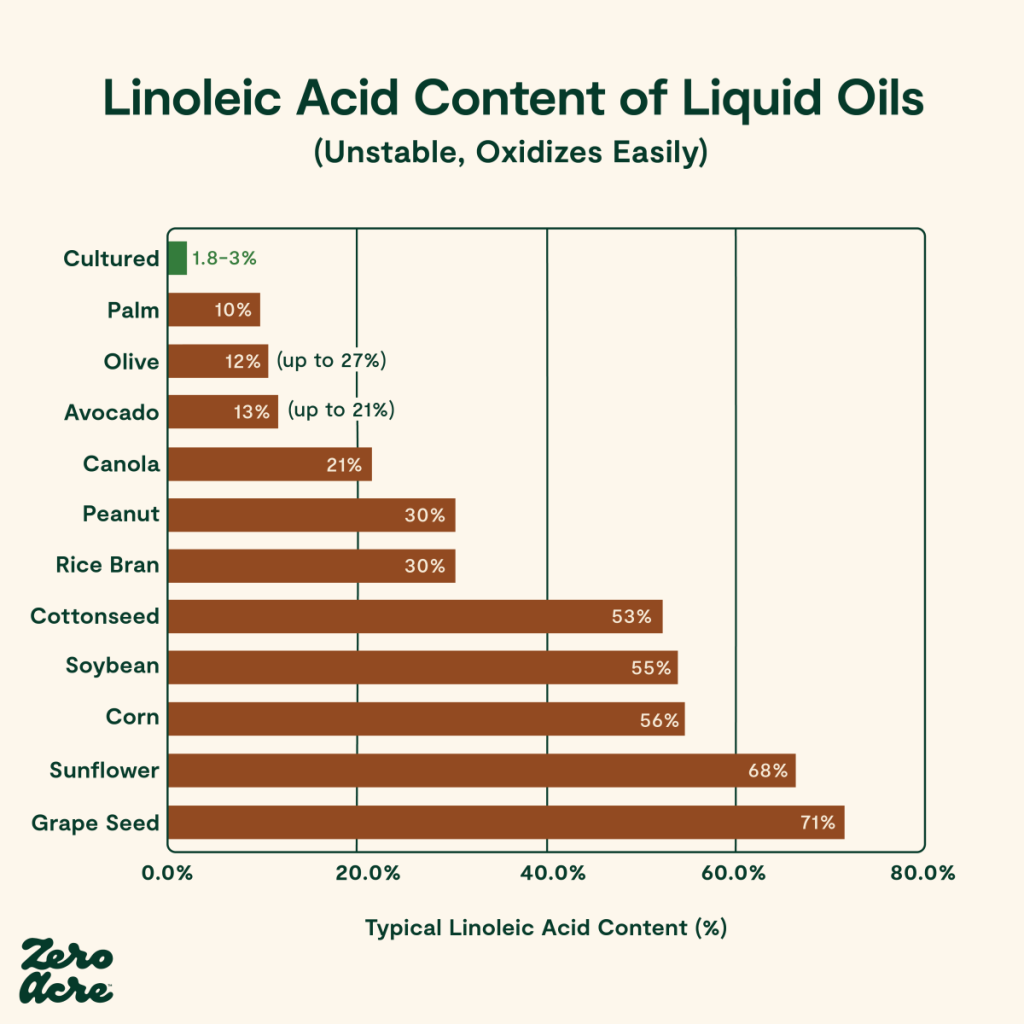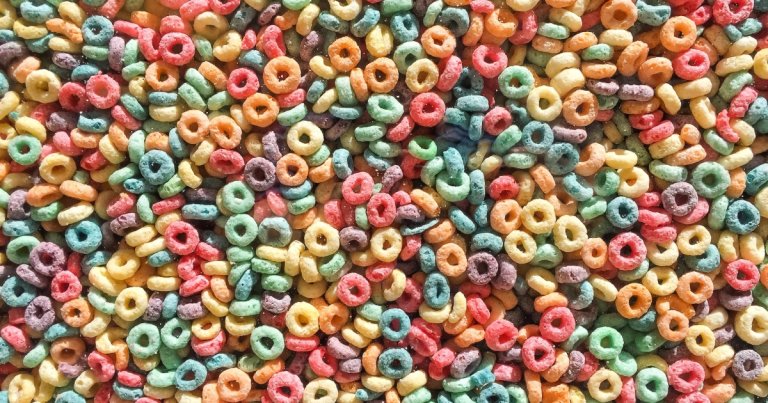The Rancid Truth: Why You Should Avoid Seed Oils

The Rise of Seed Oils: From Cheap Alternative to Ubiquitous Ingredient
Seed oils, also known as vegetable oils, have become a staple in many households. From soybean oil to canola oil, these oils are widely used for cooking and baking. Seed oils have been a popular choice in the food industry since the early 1900s, as they are a cheaper alternative to traditional animal fats like butter and lard. However, the widespread use of seed oils is a relatively recent phenomenon, driven by the food processing industry and the desire for long-shelf-life products.
Today, seed oils are ubiquitous in processed foods, from snacks to baked goods to fast food. They are used for cooking from school cafeterias to your favorite restaurants. They are also marketed as a healthy alternative to animal fats, touted for their low saturated fat content and high levels of omega-3 and omega-6 fatty acids. However, recent research suggests that consuming seed oils may not be as healthy as once thought. This blog post will discuss the rancid truth about seed oils and why you should avoid them.
The Highly Processed Nature of Seed Oils

Refining, bleaching, and deodorizing are the three main steps that seed oils go through during processing.
Refining
The refining process involves using chemicals such as hexane to extract the oil from the seeds. The oil is then heated to remove any remaining solvents and impurities. This step helps to improve the color and flavor of the oil, but it can also lead to the formation of trans fats and other harmful compounds.
Bleaching
Next, the oil is bleached using bleaching earth or activated charcoal to remove any remaining impurities and color pigments. This step helps improve the oil’s appearance, but it can also strip the oil of essential nutrients like vitamin E.
Deodorizing
Finally, the oil is deodorized to remove any unpleasant odors or flavors. This is typically done using steam or high temperatures, which can cause the oil to become rancid and oxidized. This can lead to the formation of free radicals and other harmful compounds.
Watch this video to see the processing of canola oil in action:
Overall, these steps are designed to improve the oil’s appearance, taste, and smell, but they can also lead to the formation of harmful compounds, like acrolein and 4-hydroxy-2-trans-nonenal (HNE), and the removal of essential nutrients. These compounds have been linked to various health problems, including inflammation and oxidative stress, which can contribute to the development of chronic diseases like heart disease, diabetes, and cancer.
The Omega-6 Problem with Seed Oils
Seed oils are a common staple in modern Western diets. Still, theireir high content of polyunsaturated fatty acids, specifically the omega-6 polyunsaturated fat linoleic acid, can lead to a range of health issues. While omega-6s are essential fatty acids our body needs for normal growth and development, they should be consumed in moderation. Unfortunately, many people consume excess omega-6s, contributing to chronic inflammation and other health problems, including heart disease, cancer, and autoimmune disorders.
Linoleic acid, the primary omega-6 fatty acid found in seed oils, has been linked to an increased risk of chronic inflammation and diseases. In fact, the overconsumption of linoleic acid has been associated with a higher risk of death from all causes, according to a recent study. One of the reasons for this increased risk is the imbalance of omega-6 to omega-3 fatty acids in the Western diet. The ideal ratio of omega-6 to omega-3 fatty acids is 4:1 or lower, but the typical Western diet has a ratio of 10:1 or higher. While we need both fatty acids, they should be balanced to reduce inflammation and support healthy bodily functions.

Seed oils like corn, soybean, and sunflower oil have an exceptionally high ratio of omega-6s to omega-3s, which can upset this delicate balance. As such, it’s vital to reduce our consumption of seed oils and opt for healthier fats like animal fats from pastured animals, fatty fish that are wild caught, olive oil, avocado oil, and coconut oil.
The GMO Controversy Surrounding Seed Oils

Genetically modified seed oils are a common feature in many processed foods. These oils are derived from crops that have been genetically altered to resist pests and herbicides. While the goal is to improve crop yields and reduce the use of harmful chemicals, the long-term effects of consuming genetically modified crops are not fully understood. Some studies have suggested that genetically modified crops can negatively affect human health, including allergic reactions, organ damage, and changes to gut bacteria (source, source, source, source).
Furthermore, the use of pesticides and herbicides, like glyphosate, on genetically modified crops has been linked to environmental damage (source) and the decline of pollinators like bees (source). These chemicals can contaminate water sources, harm other wildlife, and contribute to the development of antibiotic-resistant bacteria. Using these chemicals also creates a cycle of dependence, as pests and weeds become resistant to the chemicals, leading to the development of more powerful pesticides and herbicides. Overall, the widespread use of genetically modified seed oils has raised serious concerns about their impact on human health and the environment.
The Nutritional Deficiencies of Seed Oils
Seed oils are often marketed as a healthy alternative to traditional cooking oils. However, these oils are not as nutritious as some may think. Although they contain some essential fatty acids and vitamin E, the refining process removes many of the nutrients found in the original seed. Compared to unrefined seed oils, refined seed oils can have significantly lower levels of vitamins, minerals, and antioxidants.
Moreover, consuming a diet high in seed oils may interfere with the absorption of certain nutrients, like vitamin D. Studies have found that consuming a high amount of seed oils can reduce the absorption of vitamin D, a nutrient essential for bone health and immune function. This is because seed oils contain phytosterols, which can compete with vitamin D for absorption in the gut. Therefore, relying solely on seed oils as a source of dietary fat may not provide the body with the necessary nutrients for optimal health.
Healthy Alternatives to Seed Oils

Seed oils have become a popular cooking and baking ingredient due to their low cost and easy availability. However, there are concerns about their negative impact on our health, including the high levels of omega-6 fatty acids they contain. Fortunately, there are many healthier alternatives to seed oils that can be used in cooking and baking.
Animal Fats

Using animal fats like butter and lard can be a healthier alternative to seed oils for cooking and baking. While they contain saturated fats, traditionally considered unhealthy, recent research suggests this is not true (source, source, source, source). Saturated fats from grass-fed or pasture-raised animals are rich in nutrients like conjugated linoleic acid (CLA), which has been linked to improved heart health and reduced inflammation, and vitamin K2, which plays a crucial role in bone health and has been linked to a reduced risk of heart disease.
In addition to being a healthier option, animal fats also have a higher smoke point than seed oils, which makes them ideal for cooking at high temperatures. Vegetable oils, however, have a lower smoke point and can break down and form harmful compounds when heated too high.
Regarding baking, animal fats can also be a better choice. Butter, for example, adds flavor and richness to baked goods and can be a healthier alternative to vegetable shortening, which is high in unhealthy trans fats. Lard, made from pork fat, is also an excellent choice for baking as it produces tender and flaky results.
Olive Oil, Coconut Oil, & Avocado Oil

Animal fats like butter and lard are not the only healthy alternatives to seed oils for cooking and baking. Other options include olive oil, coconut oil, and avocado oil. These oils are all less processed and contain more nutrients than seed oils. For example, olive oil is a rich source of monounsaturated fatty acids, linked to a lower risk of heart disease. Coconut oil contains medium-chain triglycerides (MCTs), which can boost brain function and aid in weight loss. Avocado oil is high in oleic acid, a monounsaturated fat shown to lower inflammation and improves heart health.
One of the reasons why these oils are healthier than vegetable oils is that they have a lower ratio of omega-6 to omega-3 fatty acids. As mentioned earlier, seed oils like corn, soybean, and sunflower oil have an exceptionally high proportion of omega-6s to omega-3s, which can contribute to chronic inflammation and other health problems. In contrast, olive oil, coconut oil, and avocado oil have a more balanced ratio of these essential fatty acids, which can help promote overall health.
When it comes to cooking and baking, each of these oils has its unique properties. Olive oil is excellent for salad dressings and low-heat cooking, while coconut oil is ideal for high-heat cooking and baking. Avocado oil has a high smoke point and is versatile enough to use in various dishes. By incorporating these healthy oils into your cooking and baking, you can improve the nutritional value of your meals while reducing your intake of seed oils.
Switching to Healthier Oils: A Step Towards a Healthier Lifestyle
In conclusion, seed oils have become ubiquitous in our food due to their cheap cost and versatility. Still, their highly processed nature, high levels of omega-6s, and the use of genetically modified crops have raised health and environmental concerns. Additionally, seed oils have nutritional deficiencies and lack the beneficial properties of healthy fats from pastured animals and oils like olive, coconut, and avocado oil.
The good news is that there are healthier alternatives available that can provide the nutrients and flavor needed in cooking and baking. We can take a step towards a healthier lifestyle by switching to healthier oils. It is essential to be aware of our ingredients and make informed choices that benefit our health.
This article is my first foray into seed oils, and as such, I tried to hit the major points while keeping it at a digestible length. Unfortunately, there is much detail I knowingly glossed over and unknowingly missed. Over the coming months, I plan to continue to expand on the topic, hoping to further our understanding of seed oils and their impact on our health.
If there is one aspect of American nutrition ravaging our health and leading the charge of childhood obesity, it’s the ubiquitous of seed oils in our society.






Thanks for sharing a complex history! Time for me to think about my cooking oils more carefully.
I’m glad it was informative! Thank you for the feedback 😊.